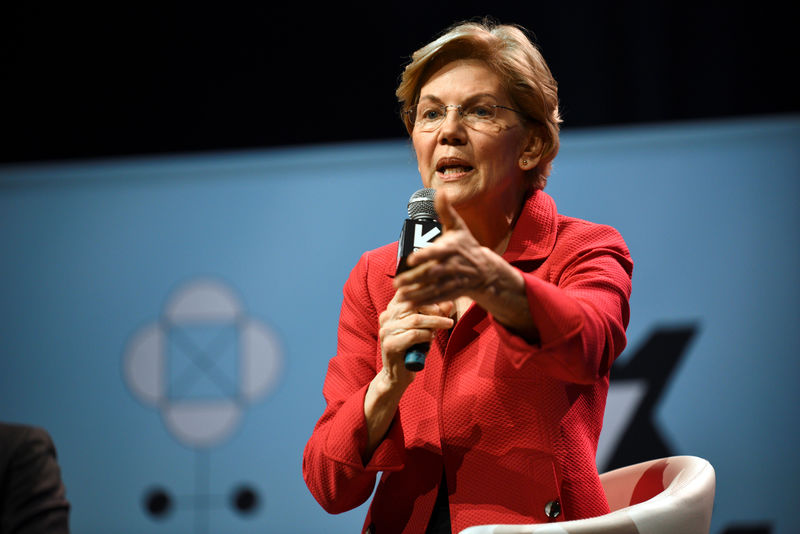By Amanda Becker
CLEVELAND, Miss. (Reuters) - U.S. Senator Elizabeth Warren was walking down a street in the town of Cleveland in the rural Mississippi Delta on Monday when she stopped to examine a small home's sagging roof.
"You can be sure there's a lot of love in these homes. They just can't afford (to fix) it," state Senator Willie Simmons told Warren during the Democratic presidential candidate's three-day campaign swing through Mississippi, Tennessee and Alabama.
Affordable housing is a chief concern for the senator from Massachusetts, who recently reintroduced a $500 billion housing plan she says will create millions of housing units and reduce rental costs by 10 percent.
But the trip to the deep South, the first extended tour of the region by any of the more than dozen Democrats vying for the party's 2020 White House nomination, also gave Warren an opportunity to try to set herself apart from the crowded and diverse field.
During meetings with housing advocates in Memphis, Tennessee, and walking tours of small Mississippi towns, Warren, who is white, tested and tailored her central message of combating income inequality to black voters, a critical Democratic voting bloc.
The trip outside the mostly white early voting states of Iowa and New Hampshire that are drawing much of the early 2020 campaign focus signaled that Warren, 69, intends to make a play for support in other states that also could prove important to securing the nomination.
"I'm running to be president of all the people, and it's important to go around the country and have a chance to talk with people face to face," Warren told reporters after a town hall that drew about 500 people to a high school in Memphis.
Democrats will have to look beyond the traditional early voting states of Iowa, New Hampshire, Nevada and South Carolina for opportunities to pick up voters next year if an obvious front-runner does not immediately emerge.
Alabama and Tennessee are among the states holding their 2020 nominating primaries on the March 3 "Super Tuesday" following South Carolina's contest. Mississippi is set to host its primary in mid-March. All three states have sizeable black populations.
Being first to those states will not guarantee votes. But it could win local endorsements and help recruit volunteers for Warren, who lags in national 2020 Democratic presidential opinion polls behind Senators Bernie Sanders and Kamala Harris.
"Warren's biggest advantage in making this trip is that she will likely have the attention of a critical mass of African-American Democratic primary voters in a cycle where the black vote will drive the nomination process," said Democratic strategist Joel Payne, who managed African-American advertising for Hillary Clinton's 2016 presidential campaign.
'VISITING HELPS'
Clinton beat Sanders in the 2016 Democratic presidential nominating race in large part because his insurgent campaign failed to gain traction with black voters and flamed out when the contest moved to the South from the early voting states.
In the general election, Clinton's loss to Republican Donald Trump was partly due to the fact that the black turnout rate declined for the first time in 20 years, according to the nonpartisan Pew Research Center.
African-American turnout in 2016 dropped 7 points from four years earlier, when Barack Obama, the first black U.S. president, was re-elected.
During her trip, Warren touted how her housing plan was aimed at closing the wealth and housing gap between white and black Americans. Her proposal would give first-time homebuyers who live in low-income, formerly segregated areas grants to use for down payments.
It is specifically tailored to benefit black families whose relatives faced discriminatory housing policies in the years leading up to the U.S. civil rights era.
Many residents said they appreciated Warren taking the time to come and focus on their issues. On Tuesday, she planned to tour historic sites in Selma, Alabama, where the 1965 "Bloody Sunday" march marked a turning point in the civil rights movement.
"Visiting helps. It lets the people down here know that somebody in Washington does care about them," said the Rev. Alice Crenshaw, 75, whose church marked the start of Warren's walking tour in Cleveland.
The tour of Cleveland on Monday ended at Senator's Place, the restaurant owned by Simmons, the Mississippi Democratic state senator. Simmons has not endorsed Warren, but like others she spent time with during the campaign swing, he seemed warm to her candidacy.
Sandra Miller-Foster, 68, arrived at Senator's Place knowing there would be a special visitor but not who. She liked what she heard from Warren.
Asked to assess the Democratic field, which includes two black U.S. senators vying for the nomination, she said policy, not race, would earn her support.

"All people want is a decent job, to own their own home and be able to send their kids to school. We've got to know what you'll do for Mississippi," Miller-Foster said.